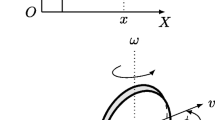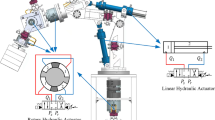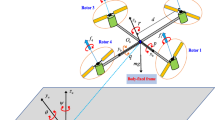Abstract
Stabilization of a pinned pendulum about its upright position via a reaction wheel is considered, where the pendulum’s angular position is measured by a single accelerometer attached directly to the pendulum. The control policy is modeled as a simple PD controller and different feedback mechanisms are investigated. It is shown that depending on the modeling concepts, the governing equations can be a retarded functional differential equation or neutral functional differential equation or even advanced functional differential equation. These types of equations have radically different stability properties. In the retarded and the neutral case the system can be stabilized, but the advanced equations are always unstable with infinitely many unstable characteristic roots. It is shown that slight modeling differences lead to significant qualitative change in the behavior of the system, which is demonstrated by means of the stability diagrams for the different models. It is concluded that digital effects, such as sampling, stabilizes the system independently on the modeling details.












Similar content being viewed by others
References
Hu HY, Wang ZH (2002) Dynamics of controlled mechanical systems with delayed feedback. Springer, Heidelberg
Kolmanovskii VB, Myshkis AD (1999) Introduction to the theory and applications of functional differential equations. Kluwer, Dordrecht
Hale JK, Lunel SMV (1993) Introduction to functional differential equations. Springer, New York
Niculescu S-I (2001) Delay effects on stability—a robust control approach. Springer, London
Xu Q, Stepan G, Wang Z (2017) Balancing a wheeled inverted pendulum with a single accelerometer in the presence of time delay. J Vib Control 23(4):604–614
Qin ZC, Li X, Zhong S, Sun JQ (2014) Control experiments on time-delayed dynamical systems. J Vib Control 20(6):827–837
Zhang XY, Sun JQ (2014) A note on the stability of linear dynamical systems with time delay. J Vib Control 20(10):1520–1527
Hajdu D, Insperger T (2016) Demonstration of the sensitivity of the Smith predictor to parameter uncertainties using stability diagrams. Int J Dyn Control 4(4):384–392
Insperger T, Wohlfart R, Turi J, Stepan G (2012) Equations with advanced arguments in stick balancing models. In: Time delay systems: methods, applications and new trends. Lecture notes in control and information sciences (LNCIS), vol 423. Springer, Berlin, pp 161–172
Gajamohan M, Muehlebach M, Widmer T, D’Andrea R (2013) The Cubli: a reaction wheel based 3D inverted pendulum. In: European control conference (ECC), 17–19, July 2013, Zürich, Switzerland, pp 268–274
Benevicius V, Ostasevicius V, Gaidys R (2013) Identification of capacitive MEMS accelerometer structure parameters for human body dynamics measurements. Sensors 13(9):11184–11195
Insperger T, Stepan G (2011) Semi-discretization for time-delay systems: stability and engineering applications. Springer, New York
Stepan G (2009) Delay effects in the human sensory system during balancing. Philos Trans R Soc A Math Phys Eng Sci 367:1195–1212
Habib G, Miklos A, Enikov ET, Stepan G, Rega G (2015) Nonlinear model-based parameter estimation and stability analysis of an aeropendulum subject to digital delayed control. Int J Dyn Control. doi:10.1007/s40435-015-0203-0
Habib G, Rega G, Stepan G (2016) Delayed digital position control of a single-DoF system and the nonlinear behavior of the act-and-wait controller. J Vib Control 22(2):481–495
Qin WB, Gomez MM, Orosz G (2017) Stability and frequency response under stochastic communication delays with applications to connected cruise control design. IEEE Trans Intell Transp Syst 18(2):388–403
Stepan G (1989) Retarded dynamical systems. Longman, London
Xu Q, Wang ZH (2014) Exact stability test of neutral delay differential equations via a rough estimation of the testing integral. Int J Dyn Control 2(2):154–163
Xu Q, Stepan G, Wang ZH (2016) Delay-dependent stability analysis by using delay-independent integral evaluation. Automatica 70:153–157
Author information
Authors and Affiliations
Corresponding author
Rights and permissions
About this article
Cite this article
Kovacs, B.A., Insperger, T. Retarded, neutral and advanced differential equation models for balancing using an accelerometer. Int. J. Dynam. Control 6, 694–706 (2018). https://doi.org/10.1007/s40435-017-0331-9
Received:
Revised:
Accepted:
Published:
Issue Date:
DOI: https://doi.org/10.1007/s40435-017-0331-9




